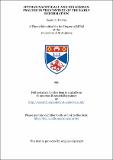Files in this item
Ottmar Nachtigall and his German psalter in the context of the early Reformation
Item metadata
| dc.contributor.advisor | Ashcroft, Jeffrey | |
| dc.contributor.author | Harvey, Susan E. | |
| dc.coverage.spatial | iv, 88 p. | en_US |
| dc.date.accessioned | 2018-06-06T11:26:32Z | |
| dc.date.available | 2018-06-06T11:26:32Z | |
| dc.date.issued | 1991-07 | |
| dc.identifier.uri | https://hdl.handle.net/10023/13769 | |
| dc.description.abstract | Ottmar Nachtigall, humanist and approximate contemporary of Erasmus and Luther, was widely travelled, learned in Greek and Latin, a priest, acquainted with many prominent thinkers and an opponent of ecclesiastical corruption. His somewhat ambivalent theological position sowed seeds of suspicion of unorthodoxy in many minds which has survived over the centuries. Yet those in ultimate authority in the Roman Catholic world held him in high regard, and this study produces no evidence that he espoused the Lutheran cause. In Strasbourg Nachtigall was a pioneer of Greek studies in Germany. In Augsburg, where he became Fugger preacher at St. Moritz, profane studies were superseded by theological ones which culminated in the publication of German Gospel Harmonies and a German translation of the Psalter with a commentary. The introduction to his Gantz Evangelisch histori (1525) reveals his attitude to Bible translation and contains the undogmatic justification of his departure from tradition with his rendering of "logos" and "gratia plena". He was aware of errors in the Vulgate text but, in the case of the Psalter, his ignorance of Hebrew hampered his efforts to rectify it. Yet the conservative nature of the translation is offset by the tone of the exegetical notes in which there are no Scholastic references and where alternative renderings are suggested. The loose translation of Romans, 3,28 in the notes to Psalm 1 introduces the controversial word "allain". In Freiburg, his refuge from Reformation disturbances, he devoted himself to priestly functions and died a traditional Catholic. Nachtigall's Psalter translation bridges the gap between the essentially medieval Latin-based precursors and Luther's Hebrew-based 1524 version. He improved the German immensely but lacked the linguistic ability necessary to give his translation the textual credibility which he believed the Vulgate version to lack. | en_US |
| dc.language.iso | en | en_US |
| dc.publisher | University of St Andrews | |
| dc.subject.lcc | BS1425.N2H2 | en |
| dc.subject.lcsh | Psalters--Germany | en |
| dc.subject.lcsh | Reformation--Germany | en |
| dc.subject.lcsh | Luscinius, Ottmar, 1487-1537 | en |
| dc.title | Ottmar Nachtigall and his German psalter in the context of the early Reformation | en_US |
| dc.type | Thesis | en_US |
| dc.type.qualificationlevel | Masters | en_US |
| dc.type.qualificationname | MPhil Master of Philosophy | en_US |
| dc.publisher.institution | The University of St Andrews | en_US |
This item appears in the following Collection(s)
Items in the St Andrews Research Repository are protected by copyright, with all rights reserved, unless otherwise indicated.

